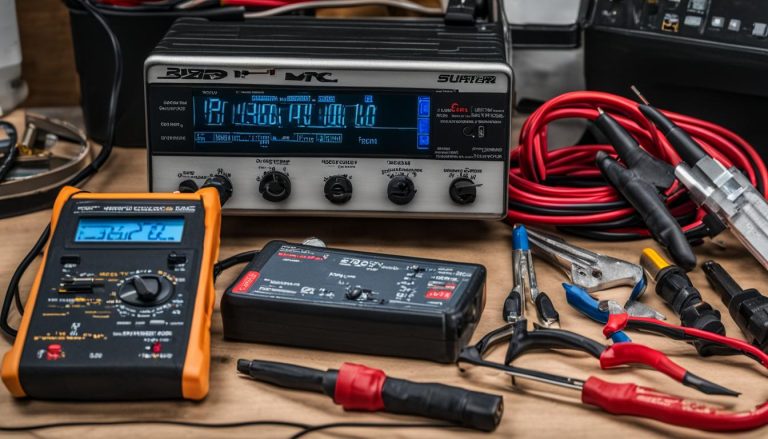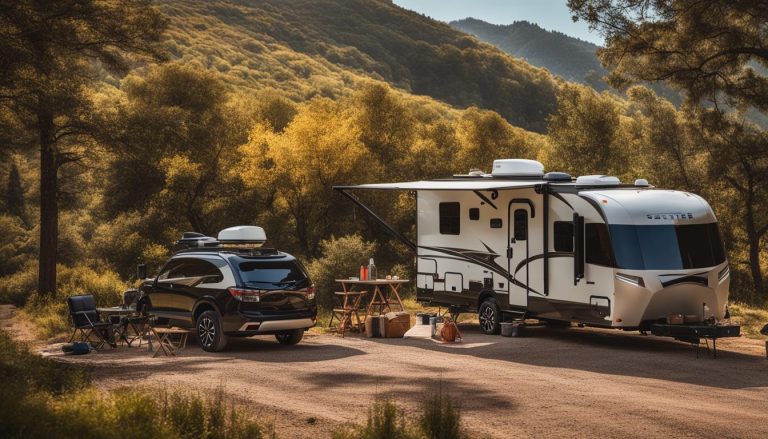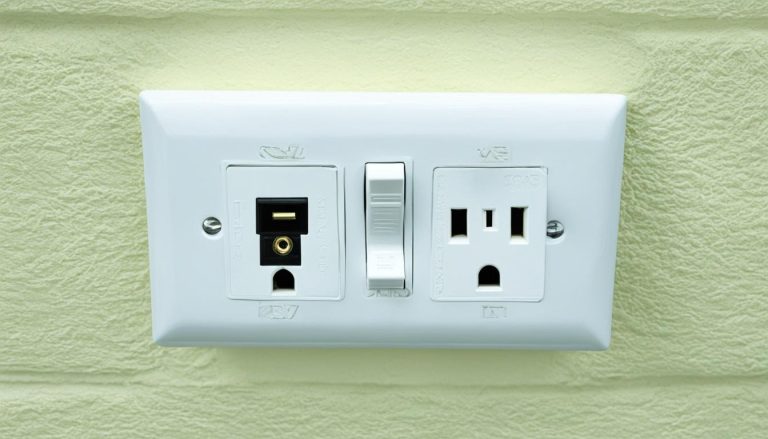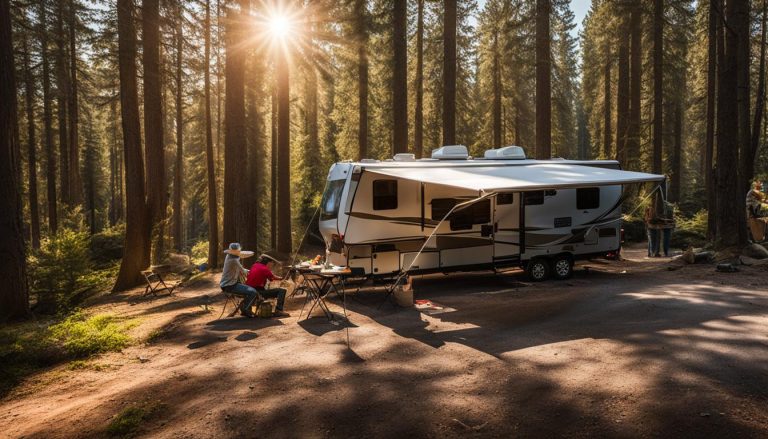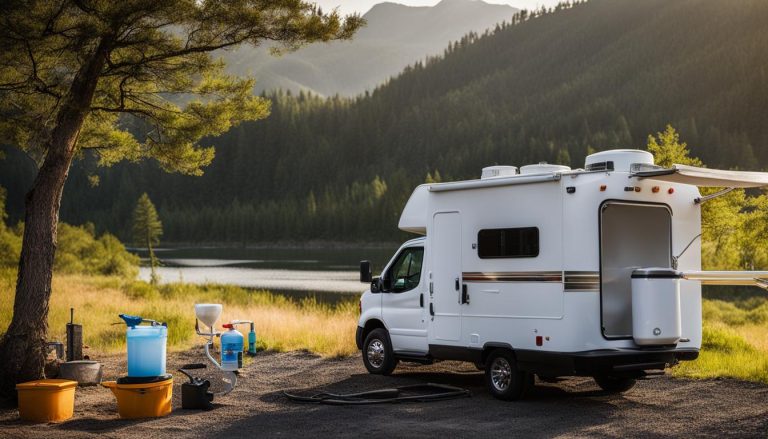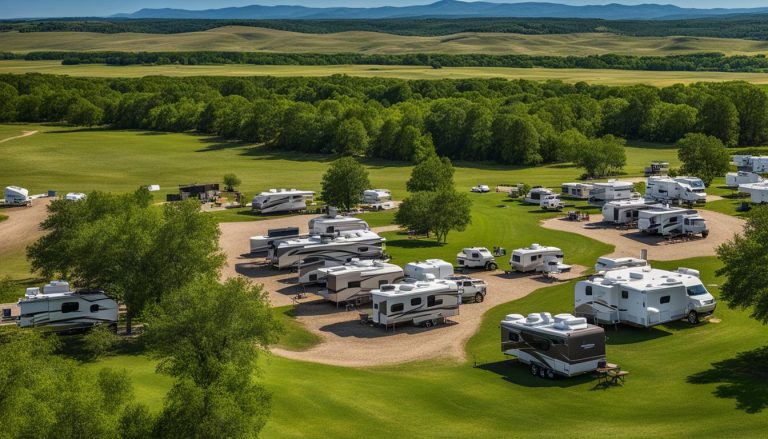Winter RVing Made Easy: Your Guide to Comfort
gorvlifestyle.com and its partners may earn a commission if you purchase a product through one of our links
Are you ready to embrace the beauty of winter while RVing? Winter RVing can be an incredibly rewarding experience, allowing you to explore picturesque landscapes covered in snow and enjoy a cozy retreat on wheels. However, it also requires careful planning and preparation to ensure your comfort and safety during the colder months.
In this guide, we will provide you with valuable tips and insights on how to RV in the winter, including winterizing your RV, staying warm inside, maintaining your water systems, and driving safely in winter conditions. With the right knowledge and essential gear, you can make your winter RVing adventure a memorable and enjoyable one.
Key Takeaways:
- Proper winter RV preparation includes insulating your RV, installing an RV skirt, and maintaining the heating system.
- Protect your RV’s plumbing system from freezing by draining water and using RV antifreeze.
- Stay warm and cozy inside your RV with space heaters, insulation, and heated bedding.
- Choose winter-friendly campgrounds and practice safe driving habits for a smooth winter RV experience.
- Regular maintenance checks are crucial to ensure the functionality of your RV during the winter months.
Getting Your RV Ready for Winter
Winterizing your RV is essential to ensure a comfortable and hassle-free experience in cold weather. Follow these steps to prepare your RV for winter and protect it from the harsh elements.
Insulating Your RV
Proper insulation is key to keeping your RV warm during winter travels. Start by sealing any gaps or cracks in the walls, floors, and ceiling with weatherstripping or foam insulation. This will prevent cold air drafts and heat loss. Consider installing insulation panels or thermal curtains in the windows to further enhance insulation.
Installing an RV Skirt
An RV skirt, also known as a RV skirting, creates an insulating barrier around the bottom of your RV. It prevents cold air from circulating underneath and helps maintain a more consistent interior temperature. RV skirts are available in various materials, such as vinyl or insulated fabric, and can be easily installed using clips or Velcro.
Maintaining Your RV Heating System
Prior to winter, it’s important to clean or replace the air filters in your RV’s heating system. A clean filter will ensure optimal performance and efficient heating. Additionally, check the propane levels and inspect the furnace for any signs of damage or malfunction. Regular maintenance of your heating system is essential to keep it operating at its best during the colder months.
Protecting Your RV Plumbing
One of the most critical aspects of winterizing your RV is protecting the plumbing system from freezing. Start by draining all water from your RV’s pipes and tanks. This includes the fresh water tank, water lines, and holding tanks. Use RV antifreeze to further safeguard the plumbing system from freezing temperatures. Make sure to follow the manufacturer’s instructions on how to properly use the antifreeze.
Preventing Freezing with Tank Heaters and Heated Water Hoses
In addition to antifreeze, consider using tank heaters and heated water hoses to prevent freezing of the water system. Tank heaters are specifically designed to keep your holding tanks warm, while heated water hoses prevent the water from freezing inside the hoses. These additional measures provide an extra layer of protection for your RV’s water system during winter.
By winterizing your RV, insulating it, maintaining the heating system, and protecting the plumbing, you can enjoy a cozy and worry-free RVing experience even in the coldest temperatures.
https://www.youtube.com/watch?v=3xN2-ahkL5g
Staying Warm Inside Your RV
When venturing out for winter RVing, it’s important to create a cozy and comfortable living space. Here are some tips to help you stay warm inside your RV:
Supplement Your Heating System with Space Heaters
Space heaters for RVs can be a game-changer in providing additional warmth. They are portable and can help distribute heat evenly throughout your RV. Consider using energy-efficient ceramic space heaters that have built-in safety features like tip-over protection.
Insulate Windows and Doors
Prevent heat from escaping through windows and doors by investing in thermal curtains, insulation film, and weatherstripping. These simple measures help keep the cold air out and the warm air in.
Manage Humidity
Controlling humidity levels inside your RV is essential to prevent condensation, which can lead to discomfort and moisture-related issues. Consider using a dehumidifier and ensuring proper ventilation to manage humidity effectively.
Stay Cozy with Heated Bedding
Make your sleeping experience warm and comfortable by investing in heated bedding, such as electric blankets or mattress pads. These can provide a luxurious and cozy feel during chilly winter nights in your RV.
| Tip | Product Recommendation |
|---|---|
| Space Heaters | EEDZ Ceramic Space Heater |
| Insulation Film | Duck MAX Strength Window Insulation Kit |
| Thermal Curtains | Deconovo Room Darkening Thermal Insulated Blackout Curtains |
| Dehumidifier | hOmeLabs 4,500 Sq. Ft Energy Star Dehumidifier |
| Heated Bedding | Sunbeam Heated Mattress Pad |
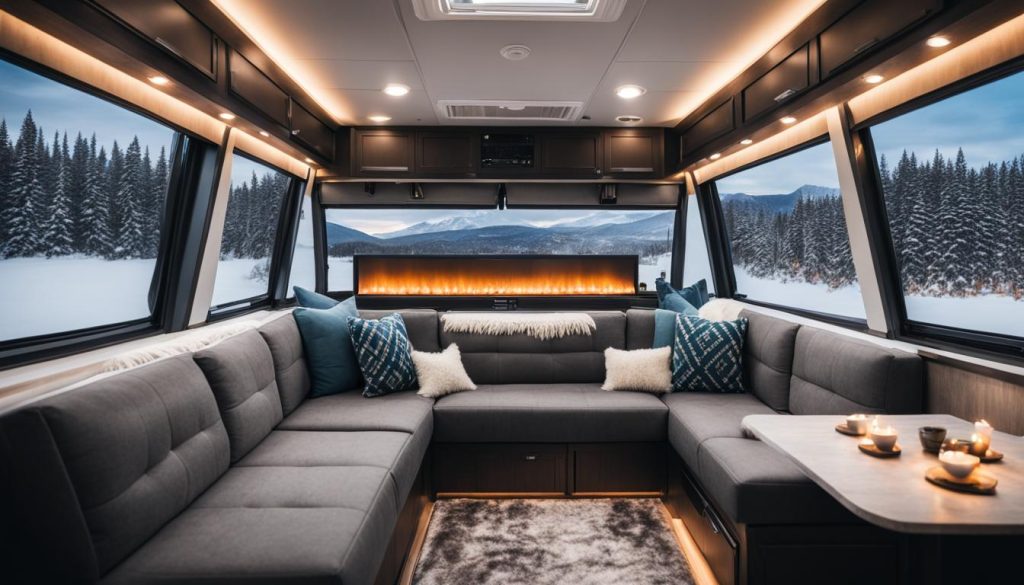
Creating a warm and cozy environment inside your RV is essential for an enjoyable winter adventure. By incorporating space heaters, insulating windows and doors, managing humidity, and using heated bedding, you can stay comfortable throughout your winter RVing journey.
Maintaining Your RV Water Systems in Winter
When it comes to winter RVing, one of the most important aspects to consider is the maintenance of your water systems. Frozen water pipes and holding tanks can lead to costly damages and inconveniences during your trip. To prevent freezing and ensure a smooth water flow, here are some essential tips to follow:
- Insulate your pipes and tanks: Insulate exposed pipes and tanks with specially designed sleeves or heat tape. This will help retain the heat and prevent freezing. Pay close attention to areas where pipes are exposed to outside elements.
- Use RV antifreeze: Before the freezing temperatures set in, make sure to drain all water from your RV’s plumbing system. Once drained, add RV antifreeze to all the pipes and holding tanks. This will protect them from freezing and avoid any potential damage.
- Keep the interior well-heated: Maintaining a warm temperature inside your RV is crucial to prevent freezing. Ensure that your heating system is working properly and set to an appropriate temperature to keep the water flowing. Insulating the interior of your RV will also help retain heat and prevent external cold from affecting the pipes.
- Consider tank heaters and insulated water hoses: For an extra layer of protection, consider using tank heaters and insulated water hoses. Tank heaters are specifically designed to prevent holding tanks from freezing, while insulated water hoses help maintain a constant flow of water even in freezing conditions.
By following these maintenance tips, you can prevent freezing of your RV water systems and ensure a comfortable and worry-free winter RVing experience.
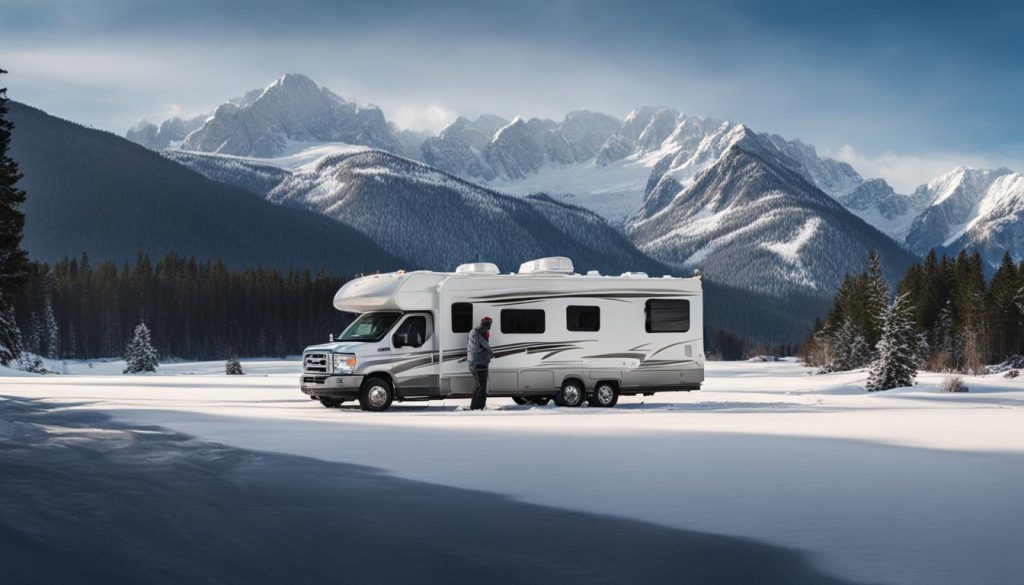
“Proper maintenance of your RV water systems is crucial during winter. Preventing freezing and maintaining water flow will save you from potential damages and inconveniences during your trip.”
Winter RV Driving and Safety Tips
When embarking on winter RV travel, it’s crucial to understand the challenges posed by winter road conditions. Before hitting the road, stay updated on weather forecasts and road condition reports in your area to ensure a safe journey.
Once on the road, adjust your driving habits to account for winter conditions. Reduce your speed and increase the following distance between your RV and other vehicles to allow for safe braking. Avoid sudden braking or turning, as these actions can lead to skids on slippery roads.
Preparing an emergency kit is essential for winter RV travel. Include items such as a first aid kit, warm clothing, non-perishable food, and a fully charged cell phone. These items can come in handy in case of any unforeseen circumstances or emergencies along the way.
Prioritizing safety is the key to a successful winter RV trip. By understanding winter road conditions, following driving precautions, and carrying an emergency kit, you can enjoy a worry-free journey and make the most of your winter RV travel experience.
FAQ
How do I prepare my RV for winter?
To prepare your RV for winter, you can start by insulating it, installing an RV skirt, and maintaining the heating system. It’s also important to protect your RV’s plumbing system from freezing by draining the water and using RV antifreeze.
What should I do to stay warm inside my RV during winter?
To stay warm inside your RV during winter, you can use space heaters to supplement your RV’s heating system. It’s also recommended to insulate your RV windows and doors, manage humidity levels, and invest in heated bedding.
How can I prevent freezing of my RV’s water pipes and holding tanks?
To prevent freezing of your RV’s water pipes and holding tanks, you can insulate them with sleeves or heat tape. Using RV antifreeze is also crucial, and you should insulate any exposed pipes. Maintaining a steady water flow by keeping the interior of your RV well-heated is another effective measure.
What are some winter driving and safety tips for RV travel?
Some winter driving and safety tips for RV travel include understanding winter road conditions, adjusting your driving habits, and staying updated on weather forecasts and road condition reports. It’s important to prioritize safety and prepare an emergency kit with essential items.

